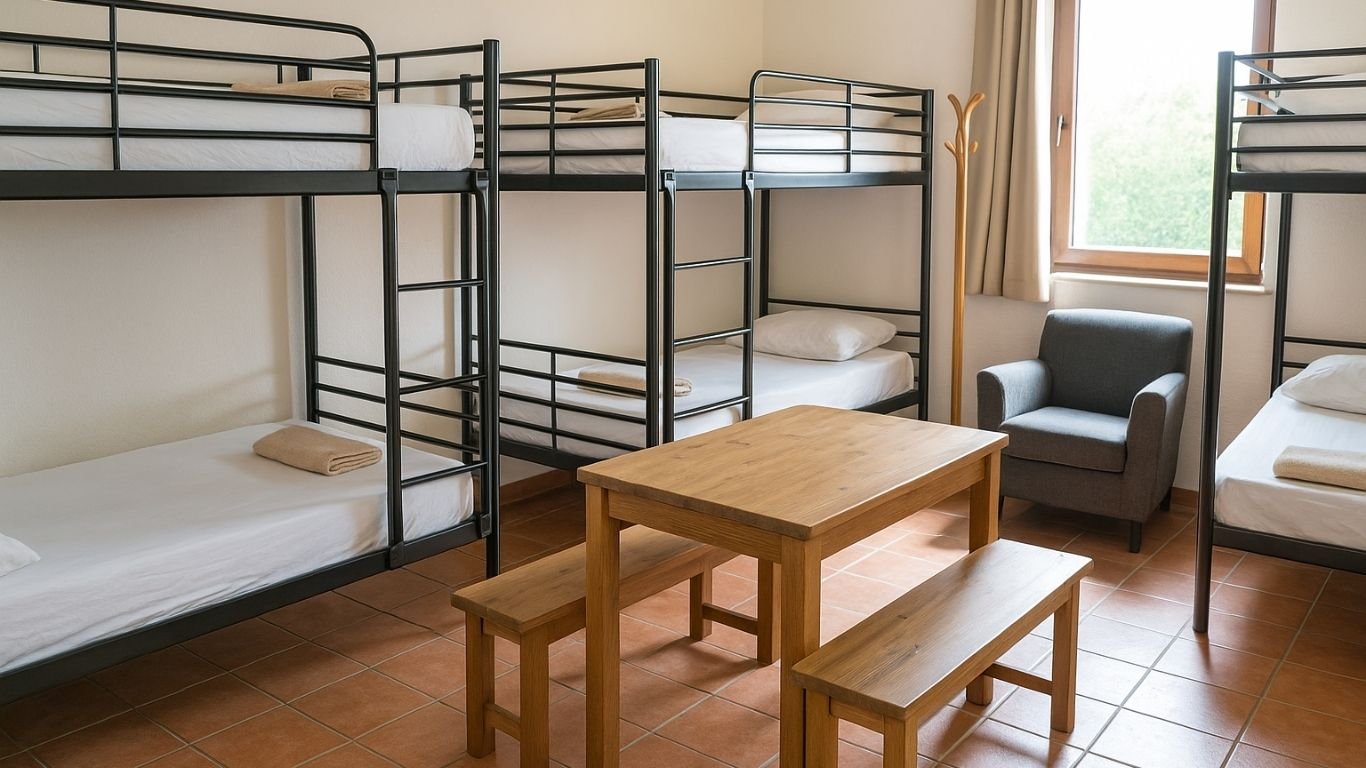Introduction to Budget Accommodation
In the realm of travel, budget accommodation is increasingly becoming a necessity for many, especially as expenses continue to rise. The cost of travel can quickly escalate with soaring prices for flights, dining, and entertainment, often leaving accommodation as one of the more significant components of a traveler’s budget. This is where budget-friendly options like hostels and Couchsurfing come into play, providing practical solutions for those looking to stretch their financial limits.
For travelers, particularly students and adventurers, the affordability offered by hostels is a significant draw. Hostels provide an opportunity for guests to share facilities and accommodations, thus reducing costs substantially compared to traditional hotels. These lodgings not only offer basic amenities at a fraction of the price but also promote social interactions among guests, fostering a community spirit. The shared nature of hostels can enhance the travel experience, allowing for the exchange of stories and recommendations, which further enriches one’s journey.
On the other hand, Couchsurfing represents an even more cost-effective alternative. This platform encourages travelers to connect with local hosts who provide a place to stay at no cost. Beyond just providing shelter, Couchsurfing allows for authentic cultural exchanges, facilitating personal connections that provide insights into the local way of life. It’s an opportunity for travelers to immerse themselves in the culture, making connections that might be more challenging to establish through conventional lodging.
As we delve deeper into this article, we will explore both hostels and Couchsurfing in greater detail. By highlighting the benefits and considerations of each option, we aim to provide travelers with the information needed to make informed decisions that align with their financial and experiential goals during their journeys.
Understanding Hostels: An Overview
Hostels have long been a popular choice for budget-conscious travelers, offering affordable accommodation in a communal setting. Historically, the concept of hosteling originated in Europe in the early 20th century, primarily aimed at providing inexpensive lodging for youth. Over the years, hostels have evolved to become more than just basic sleeping arrangements. Today, they represent a vibrant and social form of accommodation that caters to a diverse clientele, from young backpackers to seasoned travelers seeking a unique experience.
The variety of options available in modern hostels is impressive. They can range from traditional bunk bed setups in shared dormitories to private rooms with en-suite bathrooms. Many hostels also feature female-only dorms, providing a sense of safety and comfort for women traveling alone. Additionally, some hostels have embraced the trend of boutique design, incorporating stylish decor and amenities that elevate the overall guest experience. This evolution reflects the changing preferences of travelers who are looking for more than just a place to sleep.
Common features of hostels include shared kitchen facilities, communal lounges, and dining areas, fostering an environment that encourages interaction among guests. Many hostels also organize social events, tours, and activities which enhance the communal vibe, making it easier for travelers to forge connections. Amenities such as free Wi-Fi, laundry services, and rental equipment—like bicycles and lockers—further augment the appeal of hosteling. With their unique atmosphere, hostels often attract a blend of individuals—students, adventurers, and even families—who appreciate the opportunity to connect while saving on accommodation costs.

Advantages of Staying in Hostels
Hostels have gained popularity among travelers, particularly those seeking budget-friendly options for accommodation. One of the most significant advantages of staying in hostels is their affordability. Typically, hostels offer lower nightly rates compared to traditional hotels, making them a preferred choice for backpackers, students, and travelers wishing to stretch their budgets. This financial ease allows visitors to allocate more of their travel funds toward experiences and activities rather than solely on accommodation.
Moreover, hostels foster a unique social atmosphere, attracting individuals from diverse backgrounds who share a common interest in travel. This environment encourages social interaction, enabling guests to meet fellow travelers and form friendships. Many hostels provide communal areas such as kitchens, lounges, and gaming spaces, which facilitate opportunities for mingling and conversation among guests. This aspect of hostel living enhances the overall travel experience by fostering community connections.
In addition to direct social interactions, many hostels organize community events, outings, and tours, which can further enrich the travel experience. Such activities create a platform for networking among like-minded individuals, introducing guests to new experiences, cultures, and potential travel partners. Engaging in group activities can also deepen the travel experience, as it allows guests to explore destinations together and share memorable moments.
Furthermore, hostels often provide invaluable local insights, with staff frequently offering personal recommendations for attractions, eateries, and hidden gems. This local knowledge can enhance the travel experience, helping guests navigate unfamiliar cities more effectively. By prioritizing affordability, social connectivity, and opportunities for cultural immersion, hostels stand as an advantageous accommodation choice for many travelers.
Tips for Finding the Best Hostels
When embarking on a journey, securing suitable accommodation is crucial, and hostels often present an affordable alternative to hotels. To effectively find the best hostels to meet individual needs, there are several practical tips to consider.
First and foremost, thoroughly reading reviews is essential. Websites such as Hostelworld and Booking.com provide a plethora of guest experiences that can reveal valuable insights about the hostel’s ambiance, facilities, and overall quality of service. Look for recurrent themes in the reviews—if multiple guests mention issues related to cleanliness or noise, it may be a red flag. Pay special attention to recent reviews, as they reflect the current state of the hostel.
Next, comparing prices across different platforms can yield significant savings. Prices may vary between booking sites, and some hostels offer exclusive deals through their official websites. It is prudent to explore not just the base rate but also additional fees that may apply, such as charges for linens or amenities. Additionally, consider joining loyalty programs, as many platforms offer discounts or benefits for frequent travelers.
Location plays a pivotal role in the overall experience. Evaluate proximity to public transport, attractions, and essential services. Utilizing tools like Google Maps enables travelers to visualize distances and assess the accessibility of different neighborhoods. A hostel in a vibrant area may enhance the travel experience, while a remote location might detract from it.
Finally, prioritize cleanliness and security, as both factors greatly influence comfort and peace of mind during your stay. Look for hostels that have high ratings for hygiene and provide secure lockers for personal belongings. Trusted booking platforms like Hostelworld and Hostelbookers can assist in identifying top-rated options, ensuring travelers find accommodation that aligns with their expectations and requirements.
Introduction to Couchsurfing
Couchsurfing is a popular and innovative form of accommodation that allows travelers to connect with locals who offer a free place to stay. This platform operates on the principles of hospitality exchange, where individuals open their homes to share with visitors from around the world. This not only reduces travel expenses but also fosters unforgettable interactions, cultural experiences, and meaningful friendships. By utilizing the Couchsurfing platform, users can find hosts in various destinations, allowing them to immerse themselves in the local culture and lifestyle.
The essence of Couchsurfing lies in its community-oriented philosophy, which promotes cultural exchange. Members of the Couchsurfing network emphasize the sharing of experiences and knowledge, creating a sense of camaraderie among diverse populations. By staying with a host, travelers are offered insights into the local way of life, customs, and traditions that they may not encounter when staying in conventional accommodations. This immersive experience often leads to lasting connections, encouraging travelers to form bonds and possibly revisit their hosts in the future.
In addition to offering hosts a platform to share their homes, Couchsurfing allows travelers to convey their gratitude through non-monetary means. Guests are encouraged to engage with their hosts through activities such as cooking a meal, sharing stories, or exploring the city together. This reciprocal exchange strengthens the community spirit and elevates the travel experience beyond mere lodging. As more people seek to travel in a budget-friendly manner while simultaneously enjoying authentic cultural interactions, Couchsurfing continues to gain prominence among budget-conscious adventurers and cultural enthusiasts alike.

Benefits of Couchsurfing for Budget Travelers
Couchsurfing offers a myriad of advantages for budget travelers seeking alternative accommodation solutions. Primarily, it provides a cost-free lodging option, allowing travelers to save significantly on accommodation expenses. This aspect is especially appealing to those on a tight budget or those wishing to allocate their funds towards experiences and activities rather than on hotel stays. By eliminating accommodation costs, travelers can extend their journeys or enhance their experiences in other ways.
Moreover, Couchsurfing facilitates unique opportunities for travelers to connect with locals. By staying in someone’s home, travelers gain insight into the local culture that is often missing from traditional tourist experiences. This direct interaction with hosts can lead to authentic experiences that are not found in guidebooks. Hosts often share their favorite local spots, hidden gems, and cultural practices that provide a deeper understanding of the area, enriching the overall travel experience.
Another noteworthy benefit of Couchsurfing is the potential to forge lasting friendships. Many hosts and travelers develop strong bonds, resulting in culturally enriching exchanges that extend beyond mere hospitality. This communal aspect fosters a sense of belonging and offers travelers a unique opportunity to immerse themselves in local lifestyles and traditions. Additionally, the platform promotes a global community that values hospitality, making it easier for travelers to find connections wherever they may roam.
Couchsurfing also offers travelers the chance to receive insider tips regarding their destination. Hosts, being naturally familiar with their surroundings, can provide valuable insights into transportation, dining, and local attractions that may not be readily available in typical tourist information. This personalized advice can save travelers both time and money, allowing them to navigate their destination more effectively and enjoy a richer travel experience.
Tips for a Successful Couchsurfing Experience
Couchsurfing offers an exciting and cost-effective way to travel, allowing travelers to connect with locals, explore new cultures, and save money on accommodation. To ensure a fruitful Couchsurfing experience, it is essential to cultivate an impressive profile, craft meaningful requests to hosts, foster reliable communication, respect household norms, and actively contribute to the host’s environment.
Creating a compelling profile is the first step toward a successful Couchsurfing journey. Your profile should provide a genuine representation of who you are, including interests, travel experiences, and what you hope to gain from Couchsurfing. High-quality photos and a detailed description not only enhance credibility but also create a personal connection with potential hosts. Remember, hosts are more likely to accept requests from individuals who appear friendly and trustworthy.
When reaching out to hosts, focus on writing personalized requests that demonstrate genuine interest in their profiles. Tailoring each message to reflect shared interests or specific attractions near their location can increase your chances of receiving a positive response. Be clear about your travel plans, including dates and the number of guests accompanying you, which helps in setting proper expectations.
Effective communication plays a crucial role in Couchsurfing. Keeping in touch with your host before and during your stay ensures mutual understanding and comfort. Furthermore, respect for house rules is vital. Adhering to the guidelines set by your host fosters a sense of trust and respect, making the experience enjoyable for both parties.
Finally, aim to contribute positively to your host’s environment. This could mean offering to help with household chores, sharing meals, or engaging in meaningful conversations. Such gestures not only express gratitude but can also lead to lasting friendships and enriching experiences.
Safety Considerations for Budget Accommodation
When exploring budget accommodation options such as hostels and Couchsurfing, it is vital to prioritize safety. Both travel choices come with their unique set of security concerns which require careful consideration. Choosing reputable hostels with positive reviews can significantly minimize the risk of encountering unsafe situations. Researching locations beforehand, utilizing trusted review platforms, and considering travel blogs can help travelers make informed decisions about where to stay.
For those opting for Couchsurfing, the importance of trust and verification cannot be overstated. It is advisable to communicate thoroughly with hosts before arrival, asking relevant questions about their home and the neighborhood. Reading previous guests’ feedback about their experiences can provide insight into a host’s reliability. Additionally, a strong Couchsurfing profile with verified references enhances credibility. Prioritizing communication can also facilitate a sense of trust, allowing both guests and hosts to feel more comfortable during the stay.
When it comes to securing personal belongings, travelers should adopt several best practices. Always use lockers or safe storage options available at hostels, ensuring valuables are locked away when not in use. For Couchsurfing guests, it is prudent to keep essential items like passports, money, and electronics close at hand, preferably in a money belt or other secure carrying method. Using a personal lock for private storage can further enhance security.
Lastly, while meeting hosts or roommates, it’s recommended to have an open line of communication with friends or family about your whereabouts. Choosing to meet in public places before proceeding to a host’s home can significantly mitigate risks. By maintaining awareness and exercising caution, travelers can ensure a safe and enjoyable experience while taking advantage of budget accommodation options.
Conclusion: Embracing Budget Travel Without Compromise
In today’s world, finding budget-friendly accommodation is integral to making travel experiences both enjoyable and affordable. This blog post has discussed the various advantages of utilizing hostels and Couchsurfing, which not only help travelers save money but also offer unique opportunities for cultural exchange and social interaction. Hostels present an ideal environment for meeting like-minded individuals, fostering friendships, and sharing travel experiences. They often provide communal spaces for discussions and activities, thereby enriching the overall travel experience and creating lasting memories.
On the other hand, Couchsurfing allows travelers to connect with locals, thereby gaining insights into the culture and lifestyle of the places they visit. This form of accommodation is characterized by its emphasis on hospitality and the sharing of spaces, making it an interesting option for those seeking genuine interactions and deeper connections with their destinations. The spirit of Couchsurfing can lead to friendships that transcend borders, turning a simple trip into a memorable journey.
Moreover, the financial savings achieved by opting for hostels and Couchsurfing can be redirected towards exploring more attractions, trying unique local foods, or participating in exciting activities. This financial flexibility allows travelers to experience their destinations in greater depth without stretching their budgets. Reveling in shared experiences, engaging with diverse communities, and making friends around the globe illustrates that budget travel does not entail compromising on quality or enjoyment.
As readers consider their travel plans, it is crucial to acknowledge the advantages of selecting accommodations that align with a budget-conscious mindset. By embracing hostels and Couchsurfing, travelers can embark on adventures that are not only financially sustainable but also enrich their lives through unique cultural experiences. Ultimately, adopting these alternatives opens the door to a more profound understanding of the world we inhabit.
